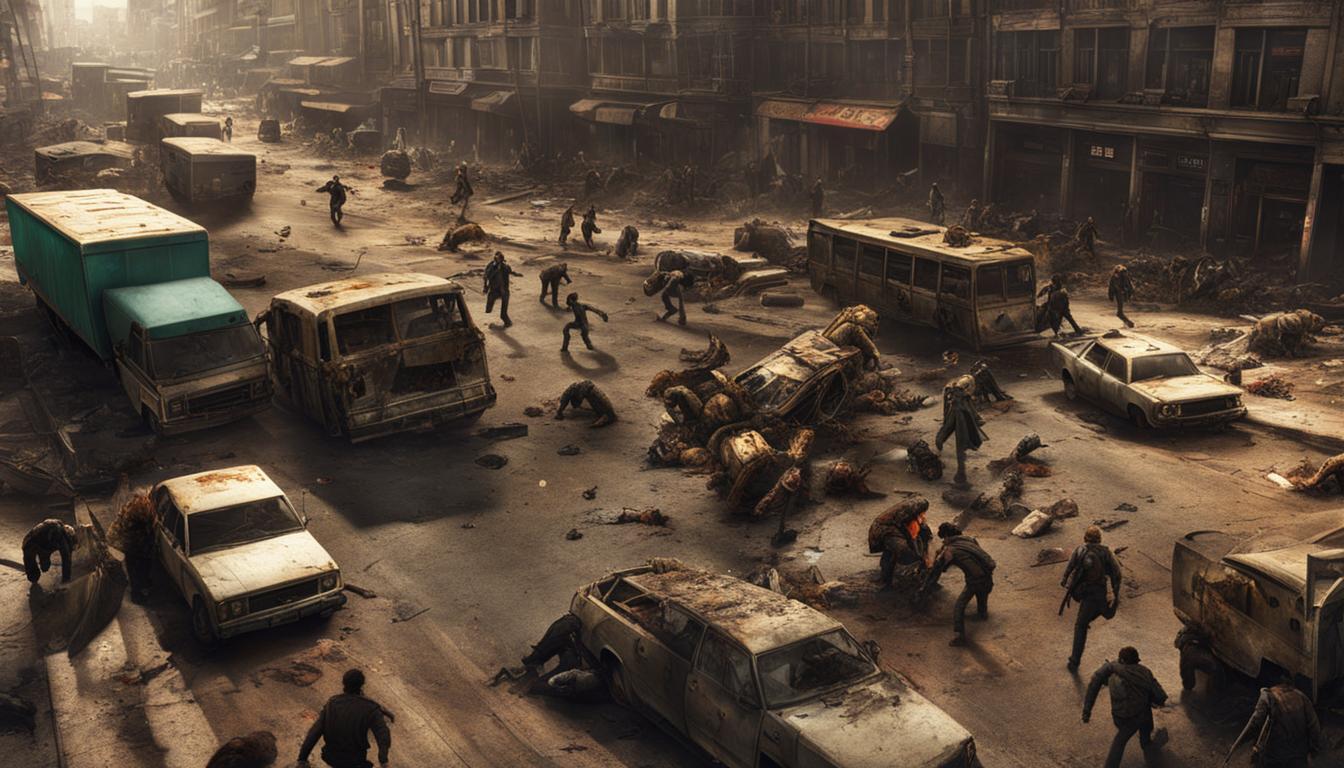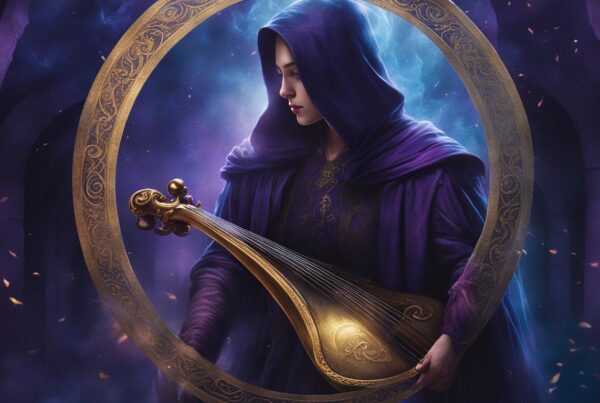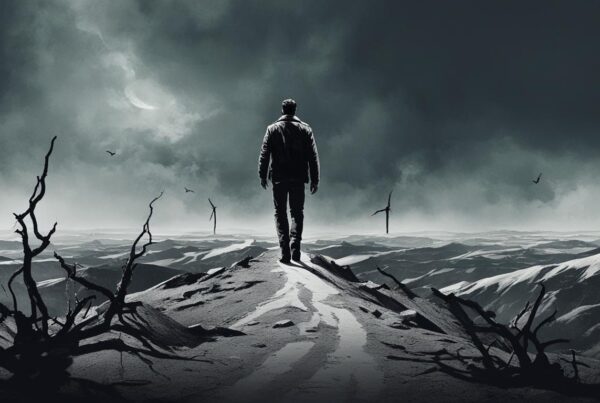Immerse yourself in the gripping chronicles of a zombie-ridden world with Max Brooks’ groundbreaking novel, “World War Z: An Oral History of the Zombie War”. This masterpiece blends horror with an insightful look into humanity’s resilience, painting a chilling yet profoundly human portrayal of a fictitious global crisis. Its non-linear storytelling—a collection of first-person interviews—sets it apart, creating a tapestry that weaves together personal stories with the tapestry of a wider, apocalyptic event. A true hallmark in the realm of speculative fiction, this zombie apocalypse narrative thrusts readers into the heart of darkness while shedding light on the strength found in collective survival.
Our World War Z review delves deep into the novel’s innovative approach, examining how Brooks’ utilization of the oral history format elevates the terror and exhilaration of a fictional pandemic. For lovers of audio literature, the audiobook review of “World War Z” reveals a uniquely compelling experience that brings an additional dimension to Brooks’ already vibrant storytelling. Join us as we explore the cataclysmic world of “World War Z” and uncover the layers of this modern classic that has firmly etched its name in the annals of zombie literature.
Introduction to “World War Z: An Oral History of the Zombie War”
Max Brooks’ “World War Z: An Oral History of the Zombie War” is a cornerstone in the terrain of apocalyptic fiction, diverging sharply from traditional storytelling through its innovative narrative structure. Brook’s choice to relay his tale through interviews creates a patchwork of personal accounts, stitching together a comprehensive global outlook on an undead apocalypse. This technique not only rejuvenates zombie literature but also opens new vistas for narrative form in related genres.
Understanding the Unique Format of Max Brooks’ Novel
The fabric of “World War Z” is woven with a series of interviews, each a personal narrative contributing to a panoramic view of a fictional dark age. It’s a stylistic device that serves as a functional pivot for the innovative narrative, pulling the reader into an intimate rendezvous with the survivors of the zombie apocalypse. The atypical format distances itself from the linear storytelling found in conventional novels, forging a stronger bond between the reader and the character’s experiences.
The Cultural Significance of Zombie Apocalyptic Themes
Zombie literature has long been a mirror, albeit a grotesque one, reflecting societal fears and global uncertainties. “World War Z” amplifies this facet by employing apocalyptic fiction to scrutinize current anxieties. In a world beleaguered by threats of pandemics and social upheaval, Brooks’ work resonates with an eerie prescience, serving not just as entertainment but also as a cultural barometer.
Max Brooks’ Contribution to the Zombie Genre
Brooks has undeniably etched his name into the chronicles of the zombie genre with “World War Z.” His portrayal of a fragmented society using disjointed yet compelling narratives reveals the potential for newness in zombie literature, steering the genre in previously unexplored directions. His contribution is a testimony to the evolving narrative forms and the resilience of apocalyptic fiction in the face of an ever-changing cultural landscape.
Deciphering the Narrative Structure
In “World War Z: An Oral History of the Zombie War,” Max Brooks employs compelling storytelling techniques to convey the haunting scope of a zombie chronicle. By juxtaposing personal interviews against the backdrop of a global narrative, the book emerges as a seminal work in apocalyptic literature.
The Use of Interviews as a Storytelling Device
The narrative of “World War Z” diverges from conventional storytelling by presenting a series of interviews. This method fosters a sense of immediacy and realism, granting voices to characters from disparate walks of life. The interview format serves as a powerful storytelling technique, ratcheting up the authenticity and emotional resonance of the survivors’ experiences during the zombie outbreak.
The Global Perspective in World War Z
Beyond individual stories, Brooks crafts a panoramic view of a world in crisis. The global narratives highlighted in “World War Z” function more than just as a framework – they become a lens for examining the interconnectedness of humanity as it faces an existential threat. This pluralistic approach underscores the diversity of human responses and cultural challenges when confronted with calamity on an international scale.
Chronology and Timeframe of the Zombie War
The chronology presented in “World War Z” spans the outbreak, panic, and eventual reclaiming of the world from the undead. It charts a timeline not linear, but rather fragmented, as experienced through the personal histories of the interviewees. The following table presents a concise overview of the timeline:
| Stage | Timeframe | Global Impact |
|---|---|---|
| Outbreak | Initial Weeks | Localized Incidents |
| Spread | Months 1-6 | International Panic |
| Response | Months 6-12 | Military Engagement |
| Reclamation | Year 2 Onwards | Rebuilding Societies |
“World War Z” and the Reflection of Real-World Issues
Max Brooks’ novel, World War Z, transcends the traditional boundaries of horror fiction to offer poignant societal commentary on how collective human behavior and governmental actions influence the outcome of global crises. The narrative, steeped in political allegories, mirrors the complexities of international relations and the often tumultuous response to large-scale emergencies.
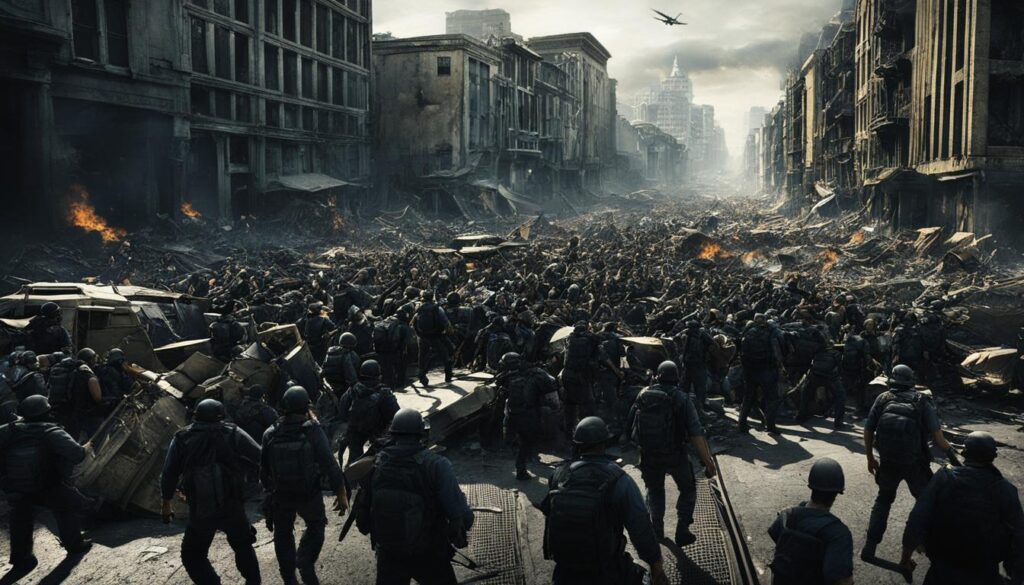
While at first glance the book presents a chilling post-apocalyptic world overrun by zombies, a deeper analysis reveals a landscape rife with analogies to current issues such as pandemic preparedness, the failures and successes of crisis management, and the resilience of societies facing existential threats. The following table illustrates key parallels between the novel’s events and prominent real-world challenges.
| World War Z Event | Real-World Issue | Commentary |
|---|---|---|
| The Great Panic | Pandemic Response | The chaos and mass hysteria in response to the zombie outbreak reflect similar public reactions to sudden global health emergencies. |
| Redeker Plan | Governmental Policies | Strategies in the book on prioritizing areas to save showcases the stark ethical dilemmas faced by governments during crises. |
| War Strategy Shift | Military Tactics | The change in military approach to a more grassroots, insurgency warfare style echoes historical military evolution during protracted conflicts. |
| Closure of Borders | Immigration and Isolationism | The sealing of borders to prevent infection spread can be seen as a metaphor for contemporary debates on immigration and national security. |
| Phalanx Vaccine Hype | Medical Misinformation | The false sense of security provided by an ineffective vaccine in the novel draws parallels to real issues surrounding medical misinformation. |
| Lobo (Tool) Utilization | Innovation and Adaptation | The creation and reliance on a new survival tool in the book highlights the ingenuity and adaptability of humans when faced with new threats. |
As these examples underscore, World War Z is not merely a narrative about zombies; it is a reflection on the human condition and societal structures when pitted against unimaginable horror. Brooks’ gripping tale challenges readers to contemplate the strength and fragility of our contemporary world, making the novel an enduring piece of literature that resonates with readers across the globe when confronted with global crises of any nature.
Character Development and Diversity
Max Brooks’ ambitious “World War Z” offers a panoramic view of a world ravaged by the zombie apocalypse, but the book’s soul resides in its dynamic characters. The novel stands as an exemplar of cross-cultural representation and narrative depth, showcasing individuals with complex layers and diverse backgrounds.
Interviewed Characters: Heroes, Commoners, and Leaders
The narrative is structured around intricate interviews featuring a multitude of characters, each bringing their unique perspective to the events. Through this approach, the reader encounters military personnel, politicians, and civilians whose detailed accounts are not mere narrative tools but well-fleshed entities contributing to the story’s rich tapestry.
Character Arcs and Their Role in the Larger Narrative
The characters’ arcs in “World War Z” are taut with growth and transformation, reflecting the dire circumstances of the world they inhabit. These arcs serve as personal journeys that, in unison, create a broader canvas illustrating the human condition amidst the backdrop of the undead threat. They also underscore the gravity of the global situation, offering insights into societal changes and human adaptability.
Representation of Different Cultures and Societies
Beyond the immediacy of survival, “World War Z” is a testament to the resilience found within varied societal structures and cultures. Each character is a voice representing a part of the world, making the novel a mosaic of human experiences. From the lanes of New Delhi to the suburbs of Tokyo, the narrative celebrates human diversity in the face of an apocalypse.
| Culture/Region | Character Represented | Role in Narrative |
|---|---|---|
| North America | Military Leader | Strategic defense perspectives |
| Europe | Politician | Political response and public address |
| Asia | Civilian | The emotional and practical toll of the zombie war |
| South America | Doctor | Medical challenges and healthcare perspective |
| Africa | Smuggler | Underworld operations and survival tactics |
| Oceania | Survivor | Rebuilding and communal efforts post-crisis |
The Audiobook Experience: A New Dimension of Storytelling
The evolution from printed text to audio has transformed the way we experience literature, with audiobook narration offering a dynamic alternative to traditional reading. “World War Z” by Max Brooks is a prime example where the audiobook version leverages audio immersion to magnify the intensity of the story. The inclusion of a full cast recording, comprising of diverse and skilled voice actors, brings unparalleled vibrancy to the post-apocalyptic narrative.
Full Cast Performance in “World War Z” Audiobook
The full cast recording of “World War Z” breathes life into the intricately woven interviews spanning the globe. Each character is given a unique voice, which not only enhances differentiation but also deepens character development, cementing the connection between listener and story. This collaboration of distinct voices elevates the audiobook to a realm of dramatic storytelling.
Sound Effects and Immersion in an Audiobook Format
Audio immersion is perfected through sound effects that accompany the narration, grounding listeners in the midst of chaos and survival. The auditory stimuli spark the listeners’ imagination, enabling them to construct their own vivid visuals. The sound effects complement the narrative, augmenting the overall suspense and thrill inherent in the zombie apocalypse theme.
Comparative Analysis: Reading vs. Listening to “World War Z”
Diving deeper into the consumption of Brooks’ masterpiece, we encounter distinct experiences between reading and listening. Below is a comparative analysis, spotlighting how each medium engages the audience:
| Reading “World War Z” | Listening to “World War Z” |
|---|---|
| Individual interpretation of characters | Characters portrayed by specialized actors |
| Personal control over pacing | Pacing directed by audio narration |
| Imagination-based visualization | Audio-enhanced sensory experience |
| Active engagement through reading | Passive engagement through listening |
| Reader-centered narrative exploration | Director-driven narrative delivery |
This analysis reveals the depth of immersion that audiobook narration can provide, making it a compelling medium for modern storytelling.
Themes Explored in “World War Z”
Max Brooks’ “World War Z” is not merely a tale of the undead’s rise but a rich narrative embroidered with deep metaphorical storytelling. This section dissects the pivotal themes that propel the novel beyond its suspense-filled plot, examining profound societal commentary, the essence of human endurance in face of survival themes, and the intricate military tactics depicted during the apocalyptic strife.
The Undead as a Metaphor for Societal Issues
The zombies in “World War Z” represent more than horror genre fixtures; they are a canvas for projecting a variety of societal issues. From pandemics to societal collapse, the undead serve as a stark metaphor for contemporary concerns, depicting the fragility and vulnerability of human civilization under unprecedented threats.
Survivalism and the Human Spirit in Adversity
Integral to “World War Z” is its exploration of survivalism, narrating the resilience and adaptability of humans. The characters in the novel embody the relentless spirit of mankind when confronted with dire circumstances. Their stories resonate with the indomitable will to live and highlight the ingenuity people can exhibit in navigating the treacherous terrain of a world gone awry.
Military Strategy and Political Commentary in the Zombie War
The narrative extends beyond mere survival to delve into the complex interplay of military tactics and political maneuvering. Brooks weaves a compelling commentary on the strategic decisions made by governments and military leaders, along with the consequences of those choices on individuals and nations battling the apocalyptic threat.
In capturing the essence of these themes, “World War Z” provides more than a chilling account of a hypothetical apocalypse; it stands as a reflection on the human condition, society’s ills, and the philosophical battlefields that complement the physical ones.
Audiobook Review: Max Brooks’ Masterful World War Z Narration
The migration from print to audiobook can transport a reader to new depths of experience, where the dimensions of voice, tone, and pause play pivotal roles in storytelling. In the audiobook rendition of World War Z, Max Brooks’ masterful narration serves as the central pillar to this immersive auditory journey, enveloping listeners with a realistic portrayal of a zombie-infested world. Brooks not only authored the novel but also lent his voice as its primary narrator, ensuring a consistency and passion in delivery that is rarely found in book recordings.
Max Brooks’ Role as the Interviewer and Storyteller
As an interviewer within the novel’s storyline, Max Brooks becomes the conduit through which personal tales of horror and heroism flow. His voice reflects the gravity of a world overrun by zombies, capturing the subtle inflections of fear, hope, and desperation found in humanity’s struggle for survival. The authenticity that Brooks brings to the narration elevates his novel beyond mere fiction into a profound exploration of the human psyche under duress.
Celebrity Narrator Contributions
The audiobook’s multidimensional quality is further enriched by a cast of celebrity voice actors, whose diverse tonalities add layers of complexity and humanity to the narrative. With the likes of Alan Alda, Mark Hamill, and John Turturro, among others, the audiobook transforms into a tapestry of voices that represent the global and multifaceted nature of the zombie war. Their performances are both complementary to Brooks’ vision and pivotal to delivering a riveting audiobook storytelling experience.
The Impact of Audio Narration on the Book’s Tension and Suspense
The immersive sound landscape of World War Z sets the stage for tension and suspense to thrive, a testament to the power of quality audiobook storytelling. The crescendos of panic, the lulls of despair, and the cadence of reflection are all amplified through voice – a sensory invocation that allows the apocalypse to resonate with the listener. It is here, in the interplay between stillness and chaos, narrated by Brooks and a stellar ensemble, that the audiobook finds its most compelling voice.
Reception and Critical Acclaim
The post-apocalyptic landscape of “World War Z” by Max Brooks gripped the literary community, sparking insightful critic reviews and provoking a notable reader response. While the novel’s unique approach to an age-old genre set it apart, the acclaim it has received can be attributed to its thought-provoking content and the realism interwoven with fiction, resonating with readers and critics alike.
The engagement with real-world issues and the innovative format led to the book garnering attention in the form of literary awards and nominations. Its impact was felt far and wide, from the shelves of avid genre fans to the critical desks of prestigious award committees. Below is a snapshot of the awards and nominations that “World War Z” has received, complimenting the sales figures that reflect its popularity.
| Award/Nomination | Year | Result |
|---|---|---|
| Hugo Award for Best Novel | 2007 | Nominated |
| Audie Award for Multi-Voiced Performance | 2007 | Won |
| Quill Award for Science Fiction | 2006 | Won |
Echoes of the readers’ voices were equally important in cementing the novel’s stature. Reader forums, book clubs, and online platforms teemed with discussions, dissections, and commendations for the book’s gripping narrative and reflective themes. Popular reader-centric websites rated the book impressively, showing a consensus in reader satisfaction.
“A harrowing tale that makes you ponder; Max Brooks delivers an unforgettable journey into fear and survival. ‘World War Z’ does more than entertain, it questions the very nature of humanity in crisis.” – an excerpt from a top critic review.
The legacy of “World War Z” is evident, not only in the accolades and discussions it inspires but also in its perpetual relevance in conversations about societal resilience in the face of catastrophic events. Its standing in the literary world serves as a testament to the power of well-crafted speculative fiction to mirror reality and engage a broad audience.
Comparing “World War Z” to Other Zombie Fiction
Zombie narratives have long held a fascination for readers and viewers alike, but few have managed to redefine the genre quite like Max Brooks’ “World War Z”. In this section, we embark on a zombie narratives comparison, evaluating how this seminal work stands against the backdrop of apocalyptic literature and solidifies its position as a genre benchmark.
While many zombie tales confine their scope to individual survival stories or small-town outbreaks, “World War Z” distinguishes itself with a global tapestry of interconnected interviews. This expansive viewpoint challenges the often narrow focus found within the genre, making it a pivotal study in apocalyptic literature and a key player in the widening of its horizons.
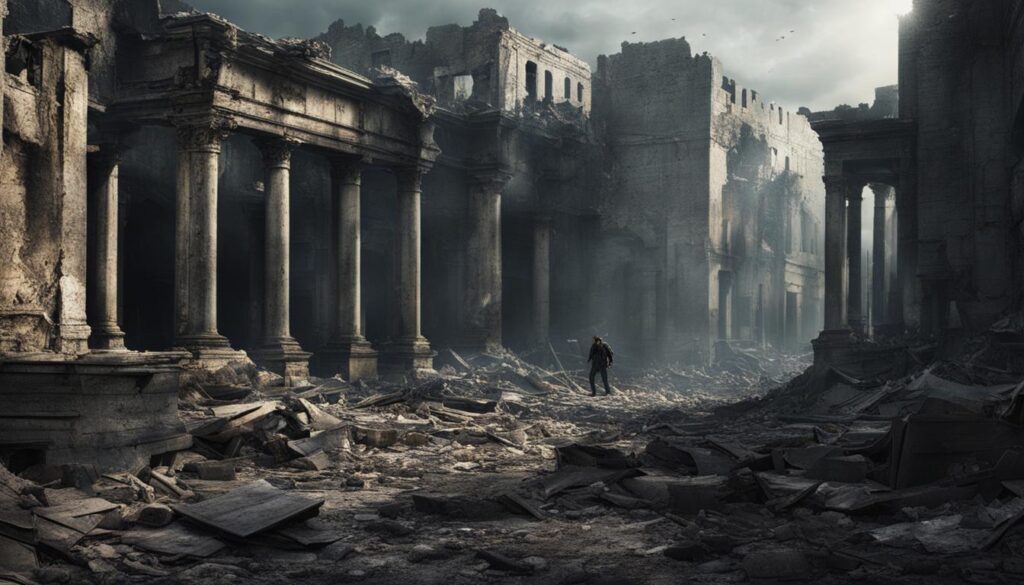
To illustrate, here is a comparative exploration of how “World War Z” compares to other works in terms of narrative techniques, thematic depth, and cultural impact.
- Approach to Zombie Outbreak: Unlike typical narratives that often start with the initial outbreak, “World War Z” provides retrospective insights, focusing on the post-apocalypse world and the rebuilding phase, which is a less-common perspective in the genre.
- Realism and Detail: Brooks’ exhaustive research into military strategies, political responses, and social dynamics endows his book with a level of realism that serves as a benchmark for subsequent entries in the genre.
- Scale and Scope: The novel’s international lens, showcasing the zombie apocalypse’s global impact, breaks away from the localized settings that many zombie fictions tend to employ, adding a novel dimension to the genre.
To further delineate the unique qualities of “World War Z” within its genre context, consider the following comparative table:
| Aspect | “World War Z” | Other Zombie Narratives |
|---|---|---|
| Narrative Structure | Interview-based, non-linear | Typically linear, single POV |
| Character Diversity | Global cross-section | Often American-centric |
| Thematic Complexity | Sociopolitical depth | Survival focus |
| Cultural Impact | Widely credited with genre innovation | Varies; some reinforce stereotypes |
| Genre Influence | Set new standards for realism and scope | Ranges from genre-typical to pioneering |
In concluding this comparison, “World War Z” emerges not just as a chilling fictional account, but as a narrative which pivots the expectations of the genre. The novel’s unique approach secures its legacy, serving as a measuring stick against which new endeavors in zombie apocalyptic writing are gauged, and cements its reputation among the esteemed ranks of apocalyptic literature.
World War Z: Behind the Scenes of the Audiobook Production
The creation of the World War Z audiobook was a monumental feat of audiobook production, incorporating a vast array of voices and a high level of technical editing to achieve a final product that is both cohesive and gripping. This section provides an in-depth look at what it took to bring the chilling world of Max Brooks’ narrative to auditory life.
The Technical Aspect: Recording and Editing
In the realm of technical editing, the production team of World War Z had to meticulously balance sound quality with the authenticity of the performances. From capturing the nuanced inflections of each actor to ensuring a seamless listening experience, the team leveraged cutting-edge recording techniques and sophisticated audio engineering.
Challenges and Achievements in Producing an Ensemble Audiobook
Assembling an ensemble cast presented unique challenges, from coordinating recording sessions to maintaining a consistent audio environment. Nevertheless, the production is lauded for its achievements in creating an immersive and dynamic soundscape that enriches the storytelling experience.
The Director’s Cut: Additional Content and Extended Interviews
The Director’s Cut adds another layer of depth to the World War Z audiobook, offering listeners director’s cut content that includes extended interviews and additional material that didn’t make it into the initial release. Dedicated fans of the work appreciate these insights, as they provide a broader understanding of the story.
| Feature | Main Audiobook | Director’s Cut |
|---|---|---|
| Length | Standard Edition | Extended Edition |
| Content | Primary Narratives | Inclusive of Extra Narratives |
| Interviews | Limited Selection | Expanded Interviews |
| Behind-the-Scenes Material | Not Included | Exclusive Insights |
How “World War Z” Has Influenced Pop Culture
Since its release, Max Brooks’ “World War Z” has made an indelible mark on entertainment and media, showcasing the profound pop culture impact of its innovative take on the zombie genre. Its narrative, which stitches together global perspectives on a catastrophic undead outbreak, has not only redefined the parameters of apocalyptic fiction but also resonated with audiences seeking cerebral depth in their thrillers. In tracing the zombie trope evolution, it’s clear that the influence of this seminal work extends beyond the printed page, seeding inspiration across various forms of media.
The media influence of “World War Z” is especially evident in the proliferation of zombie-centric content that followed. By presenting an array of personal accounts from the zombie war, the novel underscored the potential for storytelling that explores sociopolitical themes under the guise of horror. Films, television series, and even video games have borrowed from Brooks’ approach, integrating more complex narratives and character-driven plots to the previously straightforward action-centric zombie formulas. In doing so, they’ve fostered a deeper connection with audiences who crave substance with their scares.
Furthermore, “World War Z” has acted as a catalyst in the transformation of the zombie archetype in popular culture. The intelligent and systemic analysis of a world under viral threat has invited creators and consumers alike to view the undead as more than mere horrors to be vanquished. They’re reflections of societal anxieties, embodiments of crises, and cautionary symbols for the future. As we review the zombie trope evolution, it becomes irrefutable that Brooks’ masterwork has solidified its place as a landmark title that will continue to influence storytellers and thought leaders for ages to come.
